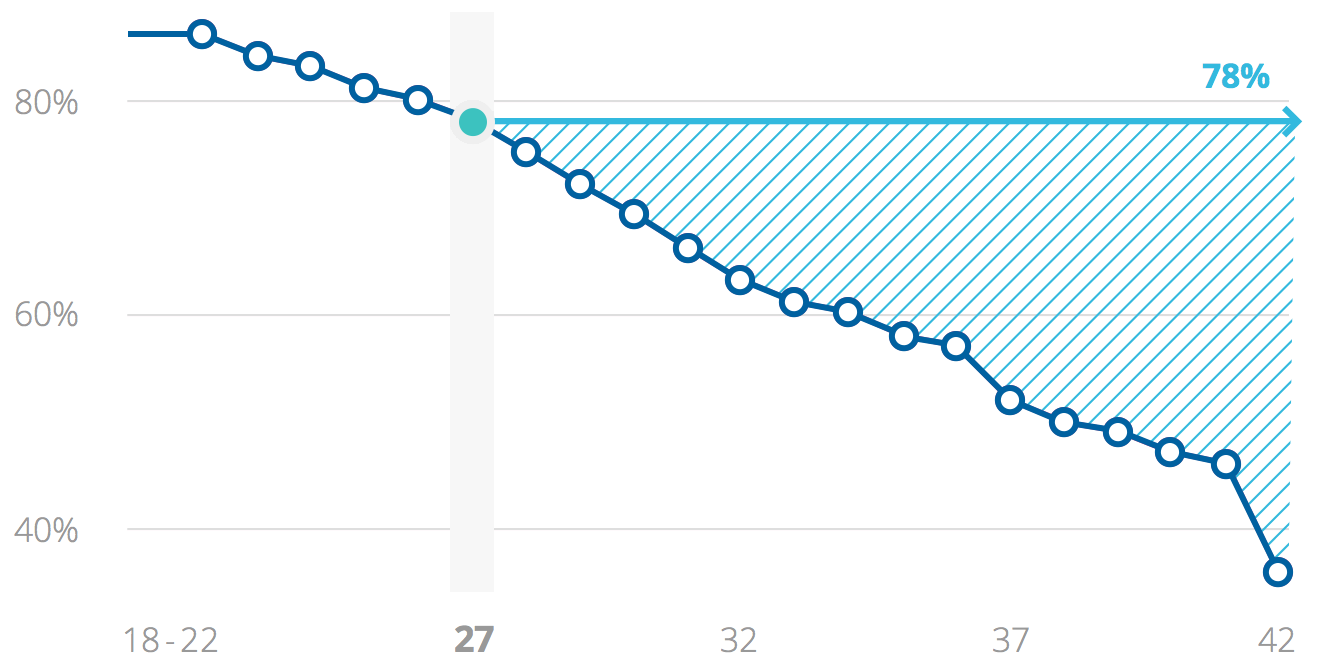Advanced maternal age pregnancy is a pregnancy that occurs when the woman is over 35 years of age. It is a term that is increasingly outdated and, from a biological point of view, implies an increased risk of complications after this age. Under certain circumstances, a pregnancy after the age of 35 requires the mother to be in constant contact with medical specialists and to undergo regular check-ups more frequently than in other cases of pregnancy at a younger age.
How to prepare for pregnancy after 35?
A woman who is thinking about preparing for pregnancy at the age of 35 should not be particularly worried. The most important thing when it comes to advanced maternal age pregnancies is that the pregnant woman is in good health. It is therefore important to prepare the body by taking into account the factors mentioned below.
Having healthy blood pressure levels
Normal blood pressure will help keep your body healthy. High blood pressure is mainly influenced by three factors: diet, stress and lifestyle. If you maintain a healthy weight, do sport and have a healthy diet (a diet rich in vegetables, fruit, whole grains and lean protein, with low sodium intake) it is easier to maintain normal blood pressure levels. It is also important to get enough sleep.
Avoid alcohol and smoking
Just as we inform our patients that alcohol is not allowed during ovarian stimulation, alcohol and tobacco are two substances to avoid if you are trying to get pregnant, as they can be detrimental to your ability to conceive.
Supplement your diet with folic acid, iron, iodine, vitamin D and choline
Vitamin supplements such as folic acid, iron, iodine, vitamin D and choline are substances that can help prevent defects in the foetus. Having good levels of vitamin D is essential for conception.
It is also important to know your cycles. When you know roughly when you are ovulating, you can more accurately programme intercourse so you can get pregnant at an older age.
What is the likelihood of pregnancy after the age of 35?
Age
Without egg freezing
With egg freezing

Recommended age limit: 40
Chance of pregnancy
The chances of pregnancy at the age of 35 are 58%. After that age, a woman’s fertility decreases significantly to below 50% by the age of 40.
Moreover, the quality of the partner’s sperm also influences the likelihood of pregnancy. Over the years, sperm lose motility and quality, although this does not drop abruptly until the age of 60. Therefore, if you are over 35 and have been trying to conceive for about six months without success, do not hesitate to seek professional help. Despite the age-related decrease in probability, a woman can still get pregnant at the age of 35, as fertility data from the Spanish statistics institute show.
At Eugin we help you choose the best assisted reproduction treatment to suit your circumstances, including both ovarian stimulation and in vitro fertilisation, along with other options.
What are the possible risks in a pregnancy at a more advanced age?
In the case of an older pregnancy there are possible complications that occur more frequently, such as an increased risk of gestational diabetes, pre-eclampsia or premature birth, as well as the baby being born with an excessively low birth weight.
On the other hand, after the age of 35 the probability of suffering a miscarriage increases considerably. This is almost 40% compared to 15% for a woman in her 20s. The reason for this is that, apart from the fact that over the years, the ovarian reserve decreases (at 40 a woman only retains around 2% of her initial reserve), the quality of the eggs that remain also deteriorates, which greatly increases the risk of the baby developing congenital defects.
Nevertheless, a woman’s age is not a contraindication for pregnancy. Older pregnancy is associated with an increased risk of developing pregnancy-related conditions. However, pre-eclampsia, gestational diabetes and foetal genetic defects are risks that specialists take into account in all kinds of pregnancies.
Why do we talk about advanced maternal age starting at 35 years?
Guidelines have changed in recent years and, with advances in obstetrics and personalised risk assessment, we could say that there is no one-size-fits-all answer for pregnant women over the age of 35. This is why the more appropriate and currently used term is “advanced maternal age pregnancy“.
In the 1970s, a time when social advances led to a greater involvement of women in university and working life, many more women were beginning to put off childbearing until later in life.
The age limit of 35 years was set at that time because it was the age at which a woman’s fertility declined significantly and the risk of complications during pregnancy was higher. To diagnose possible chromosomal abnormalities in an advanced maternal age pregnancy, amniocentesis was recommended for women who had children above this age. However, amniocentesis is only recommended in very specific cases, and there are other simpler procedures for this purpose, such as triple screening or non-invasive genetic testing.
We at Eugin are specialists in assisted reproduction. We offer you all kinds of treatments, including several in which your age is not a determining factor, as we use eggs from a donor who has undergone multiple medical and genetic tests. Make your free appointment with us now and receive the very best medical care combined with the most appropriate treatment in order to improve the chances of a woman over 35 being able to conceive and have a healthy baby.






